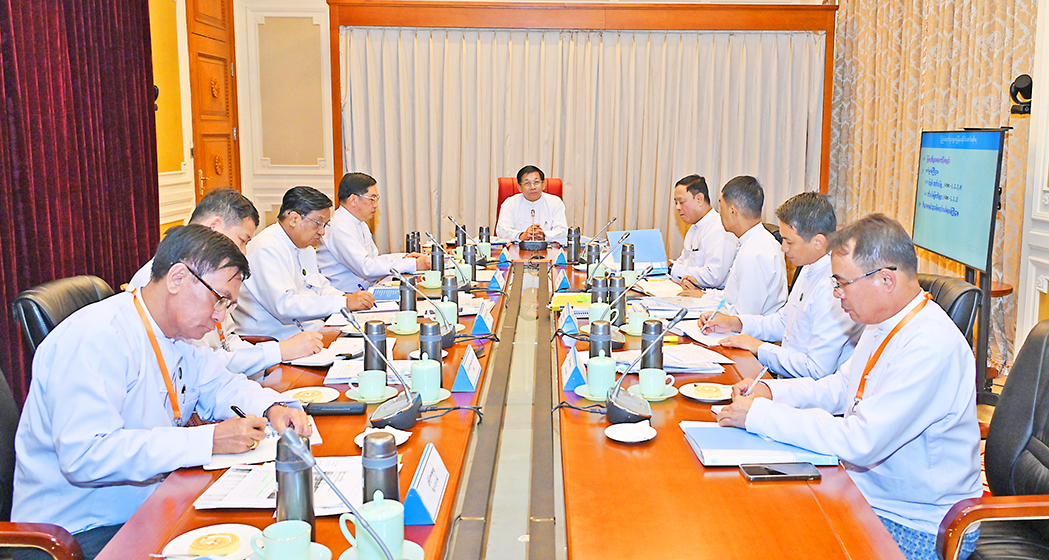Chairman of State Administration Council Prime Minister Senior General Min Aung Hlaing attends coordination meeting on development of cotton cultivation, textile industries
Nay Pyi Taw March 7
A coordination meeting on development of cotton cultivation and textile industries was held at the Office of the Chairman of the State Administration Council in Nay Pyi Taw at 2 pm today and Chairman of the State Administration Council Prime Minister Senior General Min Aung Hlaing took part in the discussions.
Also present at the meeting were Member Lt-Gen Nyo Saw of the SAC, Union Minister for Cooperatives and Rural Development U Hla Moe, Union Minister for Industry Dr Charlie Than, Union Minister for Commerce U Tun Ohn, deputy ministers and director generals.
First, the Senior General delivered a speech, saying cotton cultivation and production was discussed during the coordination meeting on development of cotton, oil crops, coffee, meat and dairy product sectors in February. Although cotton is cultivated in Myanmar, systematic production of cotton has never been carried out in the country. If about 700 vises of cotton per acre can be produced from 500,000 acres of current cotton cultivation, a population of 50 million can use about 30 yards of cloth by an individual citizen. As imports of cloth from other countries can be reduced if fine cloth can be produced from cotton raw materials being produced in the country, participants are urged to discuss the matter.
It is necessary to take measures to make standard spinning machines available in the country.
Cotton wool, Linter cotton (short thread) and cotton seeds can be produced by ginning cotton.
By doing so, job opportunities can be created. By milling cotton seeds for oil, the oil industry will be in operation and job opportunities can be created and animal feed can be produced from cotton seed pulp. As textile products can be manufactured from cotton, weaving machines will be in operation and cloth can be used in the garment industry, further job opportunities can be created. There are many other benefits for the country because textile imports can be reduced.
It is necessary to contribute to the economy of the country through cultivation and production of cotton and to manage the industry for the long term by taking cultivation methods, inputs and agricultural water into consideration. As cotton can be stored and production processes can be carried out constantly, job opportunities can be created to reduce the unemployment rate. Therefore, priority must be given to boosting cotton yields by setting targets.
Necessary investments must be invited for manufacturing textile and fine cloth from cotton.
As sufficient cloth cannot be produced in the country, it has to import cloth and textiles annually. By manufacturing high quality textiles, the garment industry will develop and fulfill the needs of the country. Therefore, participants are urged to discuss requirements for boosting cotton yields and manufacturing high quality textiles from cotton raw materials.
Union ministers, participants take part in discussions about respective sectors
SAC Member Lt-Gen Nyo Saw, union ministers and participants reported to the Senior General on cotton cultivation acreage and yields, creation of job opportunities based on cotton raw materials in the country, production capacity of state-owned and private cotton mills, shortages of cotton ginning machines and ginning processes, operating systems of ginning machines and manufacturing processes of textiles in other countries, imports of cotton raw materials from other countries and exports of cotton wool to other countries annually, manufacturing textiles in domestic textile factories based on kinds of cotton produced in the country, operations of state-owned cement factories and measures taken for boosting cement production.
Comments made on requirements on reports
After hearing the reports, the Senior General attended to the needs, saying it is necessary to manufacture required cotton ginning machines domestically and measures must be taken to distribute cotton wool in the domestic market and to manufacture high quality textiles in the country. For the development of cotton cultivation, production and textile industries, current cotton plants must be replaced with high quality grade-A cotton plants. The country needs machines and equipment to manufacture cloth and textiles from cotton raw materials produced in the country. Efforts must be made to achieve success phase by phase by adopting objectives to manufacture fine cloth. It is necessary to invite private entrepreneurs. Then, the Senior General sought required information and discussed development of cotton cultivation and production and textile industries and boosting cement production. The meeting concluded at 5.30 pm.
